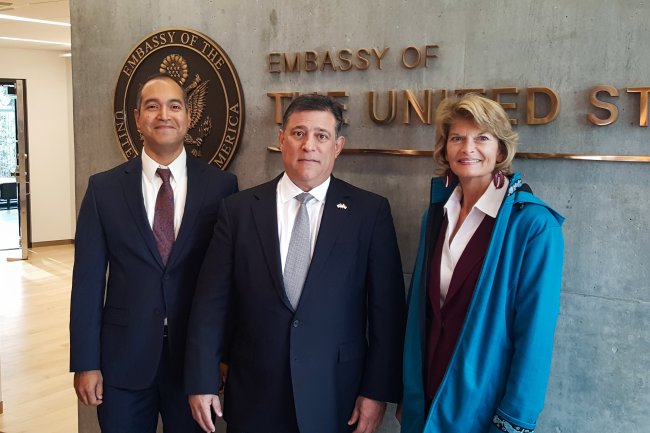Santa Fe resident awarded $570,000 for illegal robocalls
Oct. 25—Barbara Mohon registered on the Do-Not-Call list, but that didn't stop the robocalls. She tried call-blocking on her cellphone, to no avail.She pressed the "opt-out" feature offered on the pre-recorded phone messages, but the calls continued.Mohon finally decided to buy the sham "health insurance" offered just so she could speak to a real person and find out who exactly was behind the calls.Only then did the calls stop. But a trio of out-of-state men linked to the telephone solicitations are now on the hook for $570,000 in New Mexico after Mohon, a 66-year-old retired dental hygienist, took them to court. She filed suit in 2022 over what she contended was an abusive and illegal robo-dialing conspiracy.ADVERTISEMENTAdvertisementThe defendants and/or their companies already owe tens of millions of dollars in fines and judgments elsewhere around the country because of their now-defunct national robocalling operation. So Mohon, who lives in Santa Fe, realizes she might not get to c

Oct. 25—Barbara Mohon registered on the Do-Not-Call list, but that didn't stop the robocalls. She tried call-blocking on her cellphone, to no avail.
She pressed the "opt-out" feature offered on the pre-recorded phone messages, but the calls continued.
Mohon finally decided to buy the sham "health insurance" offered just so she could speak to a real person and find out who exactly was behind the calls.
Only then did the calls stop. But a trio of out-of-state men linked to the telephone solicitations are now on the hook for $570,000 in New Mexico after Mohon, a 66-year-old retired dental hygienist, took them to court. She filed suit in 2022 over what she contended was an abusive and illegal robo-dialing conspiracy.
The defendants and/or their companies already owe tens of millions of dollars in fines and judgments elsewhere around the country because of their now-defunct national robocalling operation. So Mohon, who lives in Santa Fe, realizes she might not get to collect all she is owed.
But she wants the six-figure judgment in New Mexico to get the attention of illegal robocallers everywhere.
"The message to telemarketing owners, partners and staff is to find work that is honorable and you can be proud of. Otherwise, pay up!" she told the Journal.
The defendants never responded to her federal court lawsuit, so U.S. District Judge David Urias of Albuquerque granted a default judgment against them. The case hasn't yet been closed, while three defendants, John C. Spiller II, Scott P. Shapiro and Jakob A. Mears, are notified by mail about the judge's ruling. A fourth defendant, Michael Smith, Jr., filed for bankruptcy earlier this year, so any judgment against him is on hold.
In 2021, the U.S. Federal Communications Commission levied a $225 billion fine against Spiller and Mears, both of Texas, for transmitting about 1 billion robocalls.
The fine, considered the largest of its kind, was issued against their business entities Rising Eagle and JSquared Telecom, for making illegally spoofed calls selling short-term, limited-duration health insurance plans. According the FCC, the robocalls falsely claimed to offer insurance plans from Blue Cross Blue Shield, Cigna and other well-known insurance companies.
The case against Spiller, Mears and their companies dates back to 2018, when an increase in consumer complaints about robocalls was ultimately linked to nearly 24 million health insurance robocalls being transmitted each day through the networks of the four largest wireless carriers. The FCC found that Rising Eagle was responsible for originating a large portion of the illegal calls.
In August of this year, Smith and Shapiro were each fined $73 million after attorneys general from seven states filed suit in Texas over the robocalling scheme. The final order states both men are having financial difficulties, so it's unclear how much of that penalty they will pay.
"At first I didn't think I could pursue (the defendants) legally, even though I knew it was illegal," Mohon said in an email.
She hired Santa Fe attorney Sid Childress, who had experience in filing such cases, who told her the research needed to gather proof for such a case would take time.
"The trickiest part is identifying either the source of these calls or who they're calling for," Childress said.
Federal law protects consumers from "nuisance and privacy invasion" by prohibiting almost all robocalls to a cellphone without prior consent of the called party, court records state. And the law bars calls to any subscriber on the do-not-call registry, which allows people to list their telephone numbers and thereby indicate their instructions to not receive telephone solicitations.
Mohon's lawsuit stated that beginning in June 2018 until Jan. 30, 2019, she received almost daily robocalls from the defendants or their agents trying to sell her sham health insurance.
Mohon was on the registry, her lawsuit stated, so that was one violation. The automated telemarking calls also did not identify the caller within 15 seconds after Mohon answered the phone — another violation of the law. And the "sponsors" of the message were never identified within the prerecorded voicemail messages left on her phone, as is mandated.
She tried to use a call-blocking feature on her phone, but the defendants "evaded this feature," her lawsuit alleged. The calls began to come from other phone numbers.
When Mohon stayed on the line to speak with a person to stop the calls, she was hung up on, her lawsuit states. On several occasions, she bought "the sham products" marketed as health insurance. That's how she found the identities of the sellers and their agents.
The robocalling allowed for thousands of automated calls to be initiated in a very short period of time, while sales representatives only needed to spend time with consumers who responded positively, the lawsuit alleged.
The calls, her lawsuit stated, "wasted her time, invaded her privacy, disrupted her days, were an obnoxious nuisance and cost her electricity necessary to recharge her telephone."
An online docket sheet shows the defendants were served with notice of her lawsuit but have filed no response to the allegations. Efforts by the Journal to reach them for comment this week weren't successful.
In determining the amount of damages owed Mohon, Urias concluded that 400 violations of the federal Telephone Consumer Protection Act were committed, along with 400 violations of the New Mexico Unfair Practices Act. The two laws allow damages from $100 to $500 for each violation. On top of that amount, Urias assessed "treble damages" of $330,000 in concluding the conduct was "willful or knowing."
His default order found that evidence presented against the defendants in the Texas and FCC cases confirmed "the thrust" of Mohon's allegations.
"This was really just such an egregious case of harassment and abuse," Childress said.
Childress made a video and audio recording of the voicemails as evidence, and tracked down those he believed were responsible.
Mohon said she believes the legal system should find a way to make it easier "for the average person to pursue their rights when they have been harmed" by illegal robocalling.
These days, when she gets an automated robocall, Mohon said she lets it go or considers reporting the call to Childress.
Sometimes, if a live person is on the line, she responds: "I am suing a telemarketer; would you like me to sue you too?"
The telemarketer either hangs up, she said, or continues to try to make the sale.
What's Your Reaction?

















